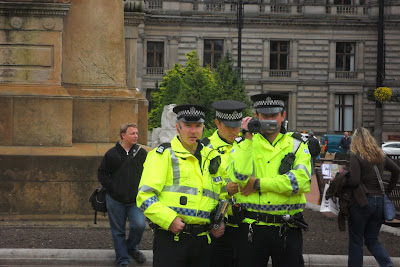Police evidence gathering team in George Sq on Saturday
Organisers of an anti sexual violence demonstration in Glasgow
Ahead of the demonstration, the organisers had sought co-operation from both Glasgow City Council and Strathclyde Police, even going as far as shortening and altering the route of the march, and changing its end location. Despite this, two organisers have now been reported to the PF.
The huge police operation mounted on the day of the march saw several police vehicles, up to six mounted officers, CCTV vans, an evidence gathering team with a handheld camera, a helicopter and a number of plain-clothes officers in attendance. This was a huge overreaction to a demo that had never been billed as anything other than a peaceful march, which consisted mostly of young women on their first demonstration.
However, the police clearly saw it as an excuse for an exercise in intimidation and intelligence gathering. A large police presence remained in Glasgow Green well after the rally had finished, with plain-clothes officers visibly scrutinising the attendance at the demonstration, attempting to pick out known activists within the crowd. It is understood that officers inside police vehicles had 'spotter cards', containing photographs of such activists. As people began to drift away, a young student activist was accosted by two plain-clothes officers as he visited a newsagent, and his details were demanded under Section 13 of the Criminal Procedure (Scotland
Similar tactics were used to gain the details of an individual at the picket of Stewart Street Strathclyde University
In charge of police operations at both Saturday and Thursday's demonstrations was Superintendent Nelson Telfer. Following Thursday's demo, he appeared in media coverage claiming that the protest was "hijacked", and promising further arrests. As the past few months have shown, when it comes to arrests and subsequent bail conditions, the police are picking their targets first and then later coming up with whatever charges they can fit. Officers made it clear in April, whilst making a round of arrests over student demos in December, that they had a 'list' of targets for arrest.
Their aim of derailing and intimidating the emerging anti-cuts movement in the city, by targeting prominent activists in whatever way they can, could not be clearer. Even where good relations have been sought - such as in the organising of the Slutwalk on Saturday - the police have responded by looking to press charges against individuals involved, and in an obvious bid to set an example to organisers of other demonstrations. Everyone involved with the anti-cuts movement in Glasgow


The police presence was required to deal with 2 events in the same place at the same time. 1 was planned and authorised, with the necessary arrangements in place. The police would have been there, for this event, even if nothing else was happening.
ReplyDeleteThe other, despite the best efforts of the union-member workers responsible, was not authorised. The slut walk organisers decided that rules that are applied to trade unions, school protests, BB companies and Orange Walks didn't apply to them. It is not “claimed” that this was an unauthorised march. It was an unauthorised march.
The organisers were given the same support and advice as all other groups, including discussions of an alternative date (4th July) which would have allowed cover such as stewarding and first aid to be in place, and avoiding leave being cancelled at the last minute for (mainly) basic grade police officers.
You state that “the organisers had sought co-operation from both Glasgow City Council and Strathclyde Police”. Wrong way round, and simply arrogant. Co-operation is a 2 way process. All events have to comply with laws and procedures, and hundreds do. This event was treated no differently from anti-cuts rallies, amongst others.
That equality of treatment includes follow-up action by the police, as is required, and has happened on other occasions.
iainmonty - you forgot to tell which laws and procedures one has to comply with in order to have an authorised march. Could you outline them for us please?
ReplyDeleteAye 'mon then monty! gies us the legal basis of an "unauthorised march"! We want chapter 'n verse or are ye gonnae be like the cops and define the law as whatever they say it is. C'mon gie us yer high legal opinion m'lud.
ReplyDeleteMichael MacGregor